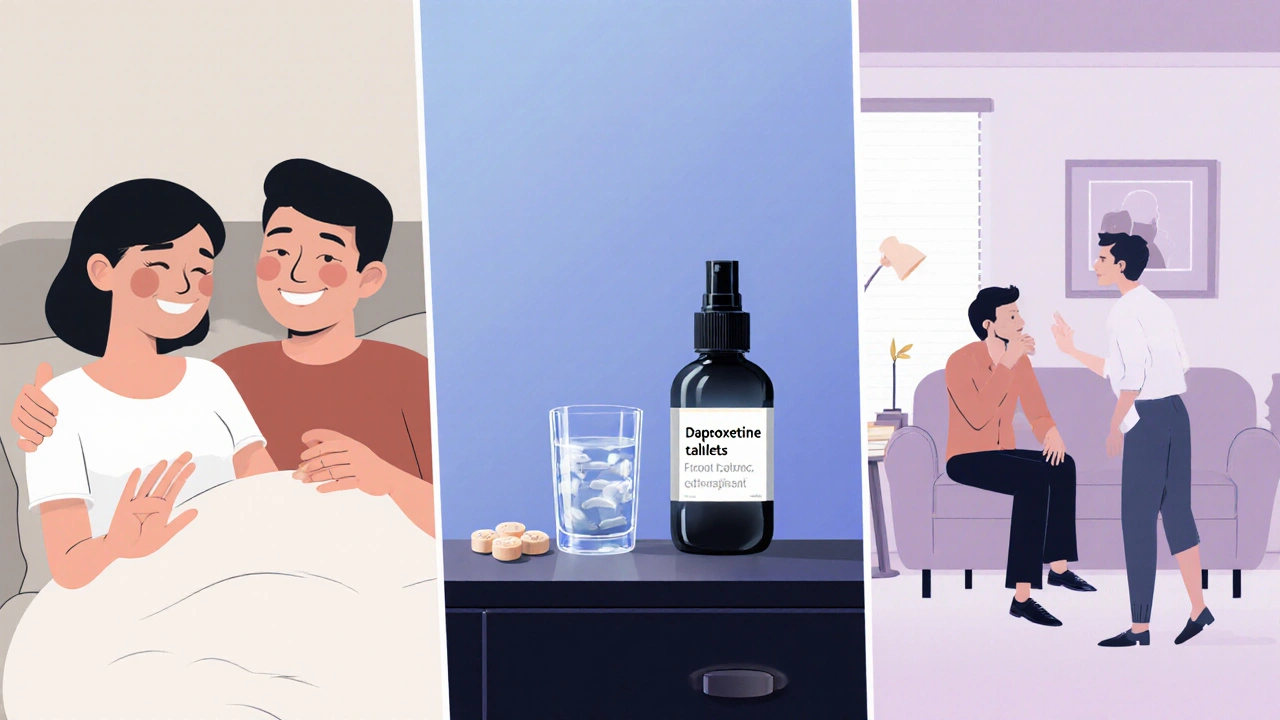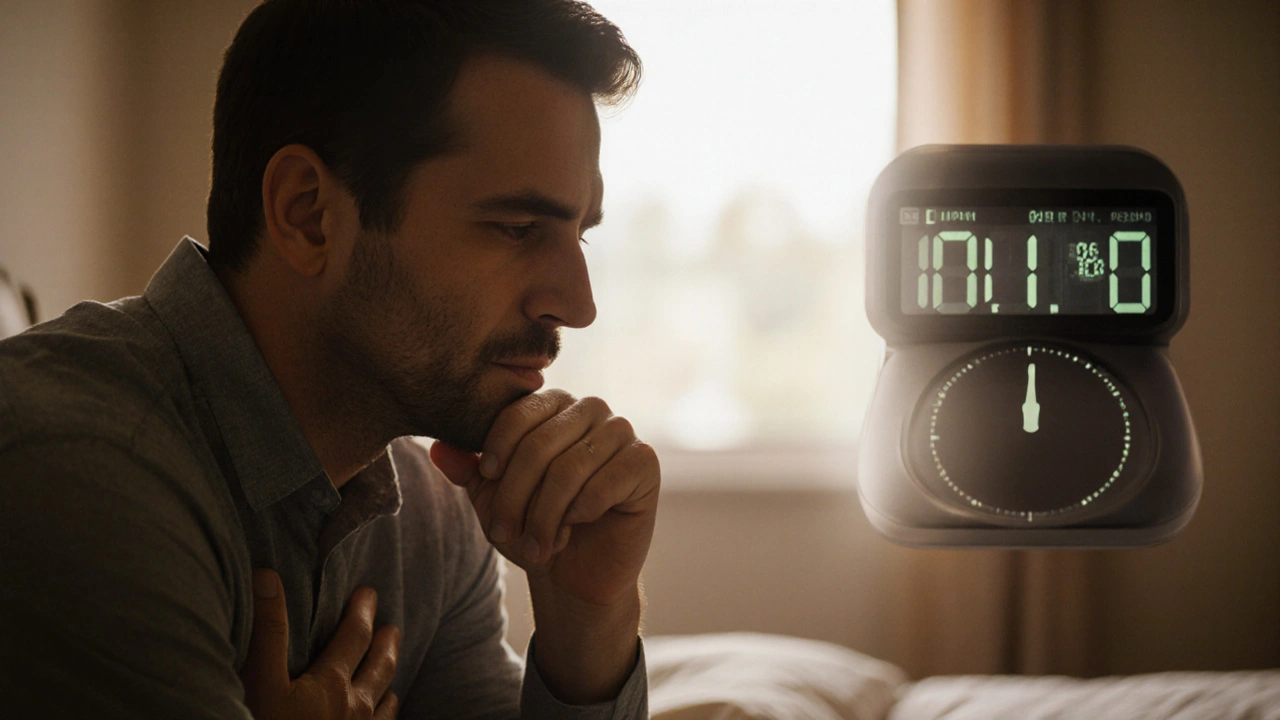Premature Ejaculation Treatment Selector
Your Recommended Treatment Options
Effective for both anxiety and physical sensitivity. Includes techniques like stop-start, squeeze, and Kegel exercises. Requires consistent practice but offers long-term benefits.
Provides on-demand relief with minimal side effects. Applied 10-15 minutes before intercourse. May slightly reduce sensation for both partners.
Effective for those with anxiety-related PE. Takes 2-4 weeks to work. Side effects may include nausea, decreased libido, or sleep issues.
Fast-acting SSRI for on-demand use. Taken 1-2 hours before intercourse. Offers quicker onset than traditional SSRIs with fewer systemic side effects.
Addresses psychological causes including performance anxiety. Improves communication between partners and provides coping strategies. Typically requires 6-12 sessions.
Finding a solution that actually works for premature ejaculation (PE) can feel like searching for a needle in a haystack. The good news is there are several proven paths-behavioral, medical, and counseling-and the right one depends on your lifestyle, health history, and personal goals. Below you’ll get a clear roadmap to match each option with the factors that matter most to you.
Understanding Premature Ejaculation
Premature ejaculation is a sexual dysfunction where ejaculation occurs sooner than desired, often within one to two minutes of penetration, causing distress for the individual or couple. It affects roughly 20‑30% of men worldwide, according to recent urology surveys, and can stem from psychological anxiety, heightened sensitivity, or underlying medical conditions such as thyroid imbalance.
Key Factors to Consider Before Picking a Treatment
- Onset of action: Some treatments work within hours (topical sprays), while others need weeks (SSRIs).
- Side‑effect profile: Weigh potential nausea, mood changes, or temporary loss of sensation.
- Convenience: Daily pills versus on‑demand sprays or exercises.
- Underlying cause: Anxiety‑driven PE often responds better to therapy; physiological sensitivity may need medication.
- Financial cost: Prescription drugs can be pricey without insurance; behavioral programs may be more affordable.
Behavioral Therapy Options
Behavioral therapy includes techniques that help men gain control over the timing of ejaculation through practiced exercises and mental strategies. The most common methods are:
- The stop‑start technique: Pause stimulation just before climax, wait 30 seconds, then resume. Repeat 3‑4 times per session.
- The squeeze method: Apply firm pressure to the penis head right before ejaculation to temporarily reduce arousal.
- Kegel exercises: Strengthen the pelvic floor muscles that support ejaculation control. Kegel exercises involve contracting the muscles you’d use to stop urinating midstream, holding for 5‑10 seconds, and releasing. Aim for three sets of ten repetitions daily.
Research from the International Society for Sexual Medicine (2023) shows that men who practiced Kegels for eight weeks reported a 25% increase in latency time.

Pharmacological Treatments
Medications fall into two broad groups: selective serotonin reuptake inhibitors (SSRIs) and rapid‑acting agents.
Selective serotonin reuptake inhibitor a class of antidepressants that delay ejaculation as a side effect. Commonly prescribed SSRIs for PE include:
- Paroxetine (30‑60 mg daily)
- Sertraline (50‑100 mg daily)
- Fluoxetine (20‑40 mg daily)
These drugs usually take 2‑4 weeks to reach full effectiveness and may cause nausea, decreased libido, or sleep disturbances.
Dapoxetine a short‑acting SSRI approved in several countries specifically for premature ejaculation. It is taken 1-2 hours before sexual activity at 30‑60 mg doses, offering a quicker onset than traditional SSRIs with fewer systemic side effects.
For men who cannot tolerate oral medication, Topical anesthetic creams or sprays that temporarily desensitize the penis to reduce sensation. Lidocaine‑prilocaine sprays (e.g., TEMPE) are applied 10‑15 minutes before intercourse. Studies report an average latency increase of 3‑5 minutes, but some users experience temporary numbness that affects partner pleasure.
Counseling and Sexual Therapy
When anxiety or relationship dynamics fuel PE, counseling can be a game‑changer.
Sexual counseling involves guided conversations with a trained therapist to address performance anxiety, communication gaps, and unrealistic expectations. Sessions typically last 45‑60 minutes, with a recommended course of 6‑12 appointments.
Sex therapist a professional specialized in sexual health who can teach coping mechanisms, mindfulness techniques, and couple‑focused exercises. A therapist may integrate behavioral techniques, prescribe medication, or suggest lifestyle tweaks like reduced alcohol intake.
Comparison of Main Treatment Options
| Type | How it Works | Typical Onset | Pros | Cons |
|---|---|---|---|---|
| Behavioral Therapy (stop‑start, squeeze, Kegels) | Trains the nervous system and pelvic floor to delay ejaculation | Immediate (technique) - weeks for muscle strength | No medication, low cost, improves overall sexual health | Requires practice, patience, and often a partner’s involvement |
| SSRIs (Paroxetine, Sertraline, Fluoxetine) | Increases serotonin levels, which naturally slows ejaculation | 2‑4 weeks | Significant latency increase, once‑daily dosing | Systemic side effects, possible mood changes |
| Dapoxetine (short‑acting SSRI) | Selective serotonin boost for a limited window | 1‑2 hours before sex | Fast‑acting, less systemic exposure | Prescription only, may cause mild nausea |
| Topical Anesthetic (lidocaine‑prilocaine spray) | Reduces penile sensitivity by numbing nerve endings | 10‑15 minutes | On‑demand, no systemic drug interactions | Potential loss of pleasure for both partners, skin irritation |
| Sexual Counseling / Therapy | Addresses psychological triggers and improves communication | Varies (often 4‑6 weeks for noticeable change) | Holistic benefit, strengthens relationship | Cost, requires time commitment, may need multiple professionals |

Practical Steps to Choose Your Best Fit
- Self‑Assessment: Write down how often PE occurs, how long after penetration, and any triggers (stress, alcohol, medication).
- Medical Check‑up: Rule out thyroid issues, prostatitis, or neurological conditions with a GP.
- Prioritize: Decide if you need an immediate fix (topical spray) or are comfortable with a longer‑term approach (behavioral therapy, SSRIs).
- Trial Period: Pick one option and give it 4‑6 weeks (except sprays, which you can test in a single session). Track latency time in a discreet journal.
- Evaluate & Adjust: If latency improves and side effects are tolerable, continue. If not, switch to another method or combine (e.g., Kegels + low‑dose SSRI).
- Include Your Partner: Open conversation about expectations and comfort can boost success rates dramatically.
Common Pitfalls and How to Avoid Them
- Skipping the medical review: Underlying health issues can render self‑prescribed meds unsafe.
- Expecting instant miracles: Even the fastest‑acting sprays need correct timing and dosage.
- Neglecting partner input: Discomfort or pressure from a partner can increase anxiety, undoing progress.
- Mixing incompatible meds: Combining SSRIs with certain antidepressants or MAO inhibitors can cause serotonin syndrome.
- Abandoning the exercise routine: Kegel benefits fade quickly without consistent practice.
Key Takeaways
- Premature ejaculation has both psychological and physiological roots; treatment should target the dominant cause.
- Behavioral techniques are cost‑effective and improve overall sexual function but demand regular practice.
- SSRIs and dapoxetine provide reliable latency gains; monitor for side effects.
- Topical anesthetics give on‑demand control but may affect pleasure for both partners.
- Sexual counseling tackles performance anxiety and strengthens relationship dynamics, often complementing other methods.
Frequently Asked Questions
Can I use over‑the‑counter creams for PE?
Most OTC creams contain mild numbing agents like benzocaine, which may provide a few extra minutes but often cause loss of sensation for both partners. Prescription‑strength lidocaine‑prilocaine sprays are generally more reliable and safer when used as directed.
Do SSRIs affect my overall mood?
Yes, because they increase serotonin throughout the brain. Some men report improved mood, while others feel emotional blunting or fatigue. Start with the lowest dose and discuss any changes with your doctor.
How long should I practice Kegel exercises before seeing results?
Consistent daily practice for 6‑8 weeks typically yields measurable improvements in ejaculation control, according to a 2023 clinical trial.
Is dapoxetine covered by Australian Medicare?
No, dapoxetine is not currently listed on the Pharmaceutical Benefits Scheme in Australia, so patients usually pay out‑of‑pocket or use private health cover.
Should my partner be involved in therapy sessions?
Involving your partner often speeds up progress. Couples’ counseling can address communication gaps and reduce performance anxiety for both parties.


Good luck!
I get why people reach for cheap over‑the‑counter creams, but most of those products are just placebos with a pinch of benzocaine. They can numb both partners and actually make intimacy less enjoyable. If you’re serious about fixing premature ejaculation, a prescription‑strength lidocaine‑prilocaine spray is a far safer bet.
A quick medical screen is often overlooked. Thyroid dysfunction or prostatitis can mimic PE symptoms, so a blood test and a urology consult are worth the few dollars. Treating the underlying issue can sometimes resolve the problem without any of the other interventions.
Man, I’ve been scrolling through forums for ages trying to figure out this whole premature ejaculation mess, and lemme tell ya, it’s a wild ride. First off, most dudes think just slapping on some numbing cream is the magic bullet, but half the time that stuff wears off faster than a bad joke. Then there’s the whole “take a daily SSRI” drama, which sounds more like a mood‑altering experiment than a legit fix. You gotta weigh the side effects – nausea, drowsy‑ness, and that weird emotional flatline that makes every conversation feel like a tax seminar. On the other hand, the behavioral stuff – stop‑start, squeeze, Kegels – sounds simple, but it’s basically a gym routine for your junk and most people bail after a week. Consistency is the name of the game, and if you’re not willing to set a reminder on your phone, you’re just gonna spin your wheels. What blew my mind was that some clinics actually combine low‑dose SSRIs with Kegel training and report solid improvements. The trick is starting low, like 25 mg of sertraline, and seeing how your body reacts before you crank it up. Don’t forget to loop in your partner; communication can turn a stressful bedroom into a supportive lab. If you’re into quick fixes, the dapoxetine route is decent – it works in an hour or two, but you still need a prescription, so the paperwork can be a pain. Topical anesthetics are great for on‑demand use, yet they can leave both parties feeling like they’re playing a game of “who can feel less.” I also read a study that said men who do Kegels for eight weeks see a 25% boost in latency, which is legit solid data. But the study also warned that once you stop the exercises, the gains can evaporate faster than a puddle in July. So my take? Mix a bit of therapy, a dash of medication if you’re cool with it, and keep the dialogue open – that’s the sweet spot. And if you’re still skeptical, just remember that every method has a trade‑off, so pick the one that fits your lifestyle best. Bottom line: there’s no one‑size‑fits‑all, but with patience and the right combo you can definitely level up your bedroom game.
It’s easy to feel swallowed by the sea of options, but start with one manageable habit-like a daily Kegel routine. Even five minutes a day can start reshaping the pelvic floor, and the confidence boost is real. Pair that with a short chat with your partner about expectations, and you’ll notice the pressure drop. Remember, progress isn’t always linear, but each small win builds momentum toward longer, more satisfying encounters.
Oh, sure, just pop a pill and expect a miracle. That’s the kind of shortcut thinking that lands most guys in a bigger mess. Maybe try a method that actually demands effort before blaming the meds?
Let’s talk metrics and ROI on sexual performance! Deploying a ‘stop‑start’ protocol is akin to a micro‑iteration sprint: you test, you adjust, you converge on optimal latency. Combine that with low‑dose dapoxetine for on‑demand boost and you’ve got a hybrid model that maximizes throughput while minimizing side‑effects. Remember, data‑driven intimacy isn’t just buzz‑word fluff; it’s about quantifying confidence.
Only Americans would think “freedom” means choosing any drug, any time. Real patriotism is about taking personal responsibility, not outsourcing your self‑control to a pharmacy.
Good evening, fellow readers. I would like to emphasize the importance of a systematic approach: begin with a thorough medical evaluation, then select a treatment modality aligned with your personal timeline and partner involvement. This structured pathway often yields sustainable outcomes while minimizing unnecessary side effects.
While the article is comprehensive, I must point out several linguistic inaccuracies. The phrase "on‑demand relief" should be hyphenated as “on‑demand‑relief” when used adjectivally. Additionally, the term "latency time" is technically redundant; simply “latency” suffices. Such meticulousness ensures the credibility of medical discourse.
The author appears to have adopted a reductionist stance, conflating distinct etiologies under a monolithic treatment algorithm. Such simplification neglects the nuanced psychodynamic interplay that often underpins premature ejaculation, thereby rendering the guidance somewhat myopic.
Hey Nora, I get where you’re coming from, but I think a balanced view helps more folks actually try something. Maybe we can list a few pros and cons together, so people can see the trade‑offs clearly?
What they don’t tell you is that big pharma has a vested interest in keeping you on daily SSRIs forever. The “fast‑acting” dapoxetine is just a marketing ploy to keep the revenue stream flowing while they patent‑lock the real solution.
From a cultural perspective, many couples still see sex as a performance, which amplifies anxiety. Normalizing open, judgment‑free conversations can shift that narrative dramatically.
Absolutely, Susan. In many traditions, the act of intimacy is regarded as a shared journey rather than a solo sprint, which can alleviate the pressure that fuels premature ejaculation. By fostering mutual empathy and patience, couples often discover subtle cues that naturally extend duration without resorting to medication.
Diego, your point about cultural narratives resonates deeply; indeed, when partners frame the experience as collaborative rather than competitive, the psychological burden diminishes considerably, leading to measurable improvements in latency. Moreover, incorporating mindfulness practices, such as synchronized breathing, can further modulate arousal levels, creating a feedback loop of calm and control. By systematically integrating these techniques-communication, cultural reframing, and physiological awareness-individuals craft a holistic strategy that transcends the limitations of any single pharmacological or behavioral intervention, offering a richer, more sustainable path to sexual satisfaction.